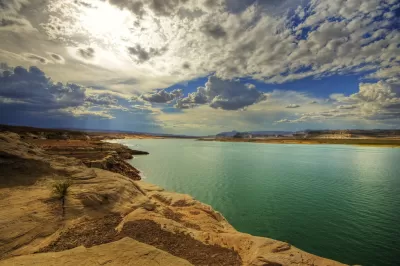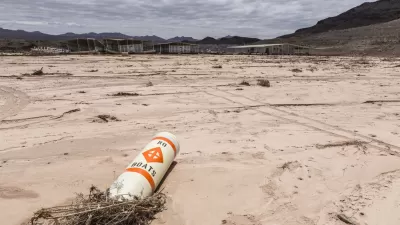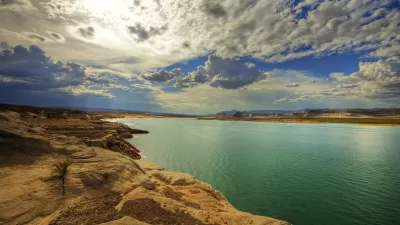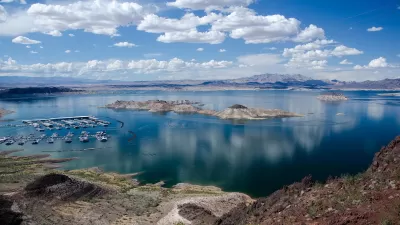Eric Balken makes the case that Lake Powell, anchored in place by the Glen Canyon Dam, is too inefficient a reservoir during times of water scarcity. Lake Mead, he says, is more than up to the task.

Water scarcity in the Colorado River Basin has prompted questions about Lake Powell, which loses up to 390,000 acre-feet of water yearly to seepage. "Nearly everyone agrees that conservation is needed basin-wide, but storing water in Lake Powell, the most wasteful reservoir in the system, isn't about saving water. Upper Basin officials fear that if Lake Powell shrinks too much, the reduced hydropower generation will drastically hike electric rates."
Glen Canyon Dam, completed in 1966, stops up the Colorado River and is the only reason Lake Powell exists. It is a key source of hydroelectric power, but it also enraged a generation of environmentalists by inundating an entire riverine ecosystem.
Balken advocates letting the waters of Lake Powell through the dam to collect in a single reservoir, Lake Mead. "This would mean Glen Canyon would transition from a reservoir destination to a world-class rafting and hiking destination. With low reservoir levels over the past decade, hundreds of miles of river and side canyons have already begun to be restored to their natural beauty." On the flip side, gas-fired plants may have to compensate for the dam's reduced generating capacity.
FULL STORY: It’s time to let Lake Powell go

Planetizen Federal Action Tracker
A weekly monitor of how Trump’s orders and actions are impacting planners and planning in America.

Congressman Proposes Bill to Rename DC Metro “Trump Train”
The Make Autorail Great Again Act would withhold federal funding to the system until the Washington Metropolitan Area Transit Authority (WMATA), rebrands as the Washington Metropolitan Authority for Greater Access (WMAGA).

DARTSpace Platform Streamlines Dallas TOD Application Process
The Dallas transit agency hopes a shorter permitting timeline will boost transit-oriented development around rail stations.

Renters Now Outnumber Homeowners in Over 200 US Suburbs
High housing costs in city centers and the new-found flexibility offered by remote work are pushing more renters to suburban areas.

The Tiny, Adorable $7,000 Car Turning Japan Onto EVs
The single seat Mibot charges from a regular plug as quickly as an iPad, and is about half the price of an average EV.

Supreme Court Ruling in Pipeline Case Guts Federal Environmental Law
The decision limits the scope of a federal law that mandates extensive environmental impact reviews of energy, infrastructure, and transportation projects.
Urban Design for Planners 1: Software Tools
This six-course series explores essential urban design concepts using open source software and equips planners with the tools they need to participate fully in the urban design process.
Planning for Universal Design
Learn the tools for implementing Universal Design in planning regulations.
Municipality of Princeton
Roanoke Valley-Alleghany Regional Commission
City of Mt Shasta
City of Camden Redevelopment Agency
City of Astoria
Transportation Research & Education Center (TREC) at Portland State University
US High Speed Rail Association
City of Camden Redevelopment Agency
Municipality of Princeton (NJ)





























